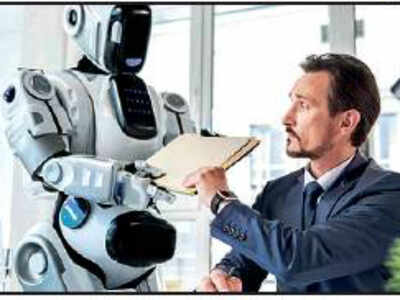
NEW YORK: When Conor Sprouls, a customer service representative in the call center of insurance giant MetLife talks to a customer over the phone, he keeps one eye on the bottom-right corner of his screen. There, in a little blue box, AI tells him how he’s doing. Talking too fast? The programm flashes an icon of a speedometer, indicating that he should slow down.
Sound sleepy? The software displays an “energy cue,” with a picture of a coffee cup. Not empathetic enough? A heart icon pops up.
For decades, people have fearfully imagined armies of hyper-efficient robots invading offices and factories, gobbling up jobs once done by humans. But in all of the worry about the potential of artificial intelligence to replace rank-and-file workers, we may have overlooked the possibility it will replace the bosses, too.
Sprouls and his colleagues still have plenty of human supervisors. But the software on their screens — made by Cogito, an AI company in Boston has become a kind of adjunct manager, always watching them. At the end of every call, Sprouls’ notifications are tallied and added to a statistics dashboard that his supervisor can view. If he hides the Cogito window by minimising it, the programme notifies his supervisor. Cogito is one of several AI programmes used in call centers and other workplaces. The goal, according to Joshua Feast, Cogito’s chief executive, is to make workers more effective by giving them real-time feedback.
The goal of automation has always been efficiency, but in this new kind of workplace, AI sees humanity itself as the thing to be optimised. Amazon uses complex algorithms to track worker productivity in its fulfillment centers, and can automatically generate the paperwork to fire workers who don’t meet their targets, as The Verge uncovered this year. (Amazon has disputed that it fires workers without human input.) IBM has used Watson, its AI platform, during employee reviews to predict future performance and claims it has a 96% accuracy rate.
Then there are the startups. Cogito, which works with large insurance companies like MetLife and Humana as well as financial and retail firms, says it has 20,000 users.
Defenders of workplace AI might argue that these systems are not meant to be overbearing. Instead, they’re meant to make workers better by reminding them to thank the customer, to empathise with the frustrated claimant on Line 1 or to avoid slacking off on the job. The best argument for workplace AI may be situations in which human bias skews decision-making, such as hiring.
Using AI to correct for human biases is a good thing. But as more AI enters the workplace, executives will have to resist the temptation to use it to tighten their grip on their workers and subject them to constant surveillance and analysis. If that happens, it won’t be the robots staging an uprising.
Sound sleepy? The software displays an “energy cue,” with a picture of a coffee cup. Not empathetic enough? A heart icon pops up.
For decades, people have fearfully imagined armies of hyper-efficient robots invading offices and factories, gobbling up jobs once done by humans. But in all of the worry about the potential of artificial intelligence to replace rank-and-file workers, we may have overlooked the possibility it will replace the bosses, too.
Sprouls and his colleagues still have plenty of human supervisors. But the software on their screens — made by Cogito, an AI company in Boston has become a kind of adjunct manager, always watching them. At the end of every call, Sprouls’ notifications are tallied and added to a statistics dashboard that his supervisor can view. If he hides the Cogito window by minimising it, the programme notifies his supervisor. Cogito is one of several AI programmes used in call centers and other workplaces. The goal, according to Joshua Feast, Cogito’s chief executive, is to make workers more effective by giving them real-time feedback.
The goal of automation has always been efficiency, but in this new kind of workplace, AI sees humanity itself as the thing to be optimised. Amazon uses complex algorithms to track worker productivity in its fulfillment centers, and can automatically generate the paperwork to fire workers who don’t meet their targets, as The Verge uncovered this year. (Amazon has disputed that it fires workers without human input.) IBM has used Watson, its AI platform, during employee reviews to predict future performance and claims it has a 96% accuracy rate.
Then there are the startups. Cogito, which works with large insurance companies like MetLife and Humana as well as financial and retail firms, says it has 20,000 users.
Defenders of workplace AI might argue that these systems are not meant to be overbearing. Instead, they’re meant to make workers better by reminding them to thank the customer, to empathise with the frustrated claimant on Line 1 or to avoid slacking off on the job. The best argument for workplace AI may be situations in which human bias skews decision-making, such as hiring.
Using AI to correct for human biases is a good thing. But as more AI enters the workplace, executives will have to resist the temptation to use it to tighten their grip on their workers and subject them to constant surveillance and analysis. If that happens, it won’t be the robots staging an uprising.
Download The Times of India News App for Latest World News.
more from times of india news
World Cup 2019
Trending Topics
LATEST VIDEOS
Trending Videos
 Madonna's 'Madame X' tops Billboard 200 chart
Madonna's 'Madame X' tops Billboard 200 chart  Shahid Kapoor and Kiara Advani starrer 'Kabir Singh' witnesses excellent first weekend, mints Rs 70.83 crore
Shahid Kapoor and Kiara Advani starrer 'Kabir Singh' witnesses excellent first weekend, mints Rs 70.83 crore  Watch: UP Police goes old school with patrolling vehicle blaring ‘jagte raho’ in Lucknow
Watch: UP Police goes old school with patrolling vehicle blaring ‘jagte raho’ in Lucknow  Indira Gandhi, then the PM of India, declared a state of Emergency in the country in 1975
Indira Gandhi, then the PM of India, declared a state of Emergency in the country in 1975
More from TOI
Navbharat Times
Featured Today in Travel
Get the app





